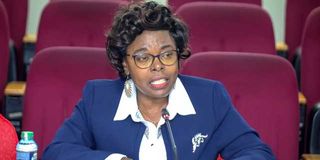Stealing from the needy? Audit faults counties on bursary funds, alleges theft

Controller of Budget Dr Margaret Nyakang'o.
An audit report has revealed that millions of shillings in bursaries for needy students could end up in the pockets of some corrupt officials in county governments.
A report by Controller of Budget Margaret Nyakang’o shows that county bursary funds are prone to mismanagement, exposing poor students to untold hardship.
The report, which covers the first six months of the 2023/2024 financial year, reveals that accounting officers of the bursary funds have failed to submit quarterly financial reports to the CoB, hampering accountability.
In various counties, financial reports for the county bursary funds, county executive car loans and mortgage schemes, education and scholarship funds were not submitted for audit.
Without this accountability, the audit revealed that the millions of shillings in bursaries could have ended up in the pockets of a few corrupt officials, leaving poor students to suffer.
Furthermore, no letters of acknowledgement or receipts from the institutions hosting the benefiting students were presented to confirm that the bursaries had been received by the schools.
As a result, it could not be ascertained whether the bursaries awarded during the year reached the intended beneficiaries and were properly accounted for.
In the absence of proper financial records, the CoB also questioned the criteria used to disburse the funds in the 47 counties.
Baringo County, for example, allocated Sh77 million to county-based funds during the period under review, representing 0.8 per cent of the county’s total budget. The county allocated at least Sh30 million to the County Bursary and Scholarship Fund.
However, no financial reports were submitted to account for the use of the money.
“During the period under review, the CoB did not receive quarterly financial reports from the fund administrators of the Baringo County Bursary and Scholarships Fund, County Executive Car Loan & House Mortgage Scheme, Baringo County Small and Medium Enterprise Fund, Baringo County Co-operative Development Fund and Baringo County Community Wildlife Conservation Fund, contrary to the requirement of Section 168 of the PFM Act, 2012,” the report reads.
Other counties fingered by the CoB include Bomet County which allocated Sh116 million to the scholarship fund, Bungoma (Sh320 million), Busia (Sh123 million), Elgeyo-Marakwet (Sh99 million), Homa Bay (Sh430 million), Kakamega (Sh263 million), Kiambu (Sh200 million), Kirinyaga (Sh184 million), Kiambu (Sh205 million), Machakos (Sh120 million), Makueni (Sh153 million), Mandera (Sh460 million), Marsabit (Sh200 million), Meru (Sh156 million) and Migori (Sh260 million).
The revelations come as some of the governors seek to centralise the allocation of bursaries.
County bosses last week said they want to streamline the awarding of bursaries to learners to avoid duplication by various government agencies and private institutions.
Bomet Governor Hillary Barchok and his Kericho counterpart Erick Mutai said the allocation of bursaries should be made seamless to ensure that all needy students are not left out.
“The governors understand the economic challenges facing Kenyans and hence the need to restructure the bursary allocation by the Ministry of Education, county governments, the Constituency Development Fund, financial institutions and the corporate sector,” Prof Barchok said.
He added that the list of needy students should be centralised to enable the various funds to select the ones they want to sponsor according to their requirements to avoid duplication, resulting in some needy learners being left out.
Prof Barchok, who was speaking during an education day at Tenwek Boys High School, said there was huge demand for bursaries by needy students.
“The various committees that award bursaries and scholarships from government institutions and various partners should come together, make a list and pick from it so that it is clear which needy cases have not been supported so that they can be addressed,” Prof Barchok said.
“As governors, we are in touch with people on the ground on a daily basis and we understand the needs of learners and their backgrounds. We cannot sit back and watch bright but needy learners drop out of school because we do not have enough resources to cover them all,” said Dr Mutai.
Governors James Orengo (Siaya) and Stephen Sang (Nandi) said counties have contributed immensely to raising the transition rate from one level of education to another.





